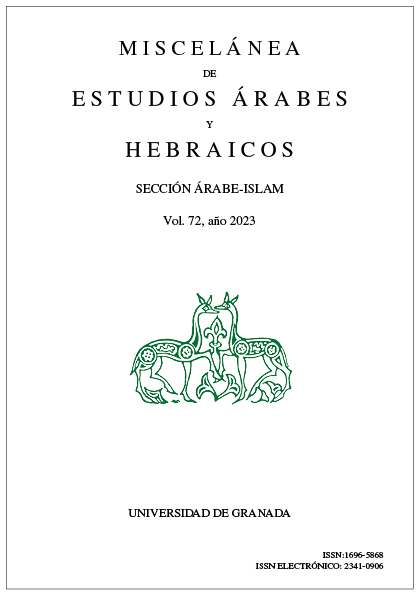The So-called “Generation of Independance” in Mauritania through Five of its Poets
DOI:
https://doi.org/10.30827/meaharabe.v72.24820Keywords:
Mauritanian literature. Mauritanian poetry. Ŷīl al-istiqlāl (Generation of Inde- pendence). Poets of the Independence GenerationAbstract
Important historical events sometimes result in the emergence of a collective awareness that can turn into a political, social, cultural or literary movement. The proclamation of independence in several Arab countries led to the birth of literary trends. This was the case in Mauritania in the 1960s when, after gaining its independence, a poetic movement called Ŷīl al-istiqlāl (Generation of Independence) emerged. The poets who witnessed the birth and early years of the new state became aware of the need to renew poetry in order to initiate the Mauritanian literary nahḍa. In this article we outline the main characteristics of the group of poets known as Ŷīl al-istiqlāl through the biographies and sample poems of five poets, and also discuss the stylistic differences that can be observed within this Generation.
Downloads
References
Al-ʿArabī, 1397 (junio 1977), pp. 69-86 y 1403 (abril 1983), pp. 100-123.
BAN ʿABD AL-ḤAYY, Muḥammad. Jadīŷa Bint ʿAbd al-Ḥayy al-Aʿmāl al- kāmila madjal bi-qalam al-duktūr Muḥammad Ban ʿAbd al-Ḥayy. Nuakchot: Sadanat al-Ḥarf, 2018.
BAN ʿUMAR, al-Muṣṭfà. Dīwān Muḥammad al-Amīn ban Muḥammad Fāḍil. Nuakchot: Escuela Superior de Profesores e Inspectores, 1987.
GARCÍA GÓMEZ, Emilio. Poemas Arabigoandaluces. Madrid: Espasa-Calpe, 19858.
ḤASAN ZARZŪR, Naʿīm. (ed.). Maŷmaʿ al-amṯāl li-Abī l-Faḍl Aḥmad b. Muḥammad b. Aḥmad b. Ibrāhīm al-Nīsābūrī l-Maydānī. Beirut: Dār al-Kutub al-ʿIlmiyya, 1987.
KĀBIR HĀŠIM, Muḥammad. Ḥadīṯ al-najīl. Nuakchot: Manšūrāt Ittiḥād al- Udabāʾ wa-l-Kuttāb al-Mūrītāniyyīn, 2007.
AL-MAQDISĪ, Anīs. Al-Ittiŷāhāt al-adabiyya fī l-ʿālam al-ʿarabī l-ḥadīṯ. Beirut: Dār al-ʿIlm li-l-Malāŷīn, 1973.
MARTÍNEZ MONTÁVEZ, Pedro. Literatura iraquí contemporánea. Madrid: Instituto Hispano-Árabe de Cultura, 1977.
—. Introducción a la literatura árabe moderna. Madrid: Editorial Cantarabia, 1985. Muʿŷam al-bābṭayn li-šuʿarāʾ al-ʿarab. https://www.almoajam.org/lists/inner/ 5147 [consultado el 15/05/2022].
AL-NAḤWῙ, al-Jalīl. Bilād Šinqīṭ al-manāra wa-l-ribāṭ. Túnez: al-Munaẓẓāma al-ʿArabiyya li-l-Tarbiyya wa-l-Ṯaqāfa wa-l-ʿUlūm, 1987.
NANTET, Bernard. Histoire du Sahara et des Sahariens. París: Ibiss Press, 2008. OULD CHEIKH, Abdel Wedoud. Eléments d´histoire de la Mauritanie. Nuak-
chot: Centre Culturel Français A. de St Exupéry, 1988.
OULD CHEIKH, Abdel Wedoud. “La Mauritanie: pays qui descend”. Notre Li- brairie, 120-121 (janvier-mars 1995), pp. 22-35.
OULD MOHAMED BABA, Ahmed Salem. “La maḥaḍra de Mauritania: Una universidad nómada”. Al-Andalus-Magreb, 19 (2012), pp. 345-360.
—. “Nuakchot: un misterioso nombre para una ciudad que emergió del desierto”. En MEOUAK, M. y DE LA PUENTE, C. (eds.). Vivir de tal suerte. Homena- je a Juan Antonio Souto Lasala. Córdoba: CNERU-CESIC. Oriens Academic. 2014, pp. 367-377.
—. “Poetry in Ḥassāniyyah (lə-ġna) and Anticolonial Resistance in Mauritania”.
La Rivista di Arablit, 20 (2020), pp. 11-30.
—. “Edición y traducción del texto ḥassāní manuscrito de la primera constitución mauritana”. Miscelánea de Estudios árabes y hebraicos, 70 (2021), pp. 239- 265.
PAUCHET D´EIXONNE, Marie-Pierrette. “Saint Exupéry et Terre des hom- mes”, Notre Librairie nº 120-121 (janvier-mars) 1995, pp. 75-77.
RUBIERA MATA, María Jesús. Al-Muʿtamid Ibn ʿAbbād Poesías Anatología bilingüe por. Madrid: Instituto Hispano-Árabe de Cultura, 1982.
AL-ŠĀBBĪ, Abū l-Qāsim. Agānī l-ḥayāt. El Cairo: Dār Miṣr li-l-Ṭibāʿa, 1955.
AL-SĀLIM, al-Mujtār. “Nwākšūṭ ʿarūs al-šiʿr wa-madīnatuhu”. Al-Qawāfī, 13 (sep. 2020), pp. 36-44.
AL-ŠINQĪṬĪ, Aḥmad b. al-Amīn. Al-Waṣiṭ fī taṛāŷim udabāʾ šinqīṭ. El Cairo: Maktabat al-Janŷī, 1911.
WULD ABNU, Mūsā et alii (eds.). Al-Wasīṭ fī l-adab al-mūrītānī l-ḥadīṯ. Nuak- chot: al-Maṭbaʿa al-Waṭaniyya, 1997.
WULD AL-AMŶĀD, Sīdi. Jiyām mūrītāniyya. Kuwait: Šarikat City Grafic, 2004.
—. ʿUyūn al-jayl. Nuakchot: Dār Ŷusūr ʿAbd al-ʿAzīz. 2020.
WULD BAH, Muḥammad al-Mujtār. Al-Siʿr wa-l-šuʿarāʾ fī Mūrītānyā. Túnez: al-Šarika al-Tūnisiyya li-l-Tawzīʿ, 1987.
WULD BAH, al-Siyyid (ed.). Mūrītānyā al-ṯaqāfa wa-l-dawla wa-l-muŷtamaʿ. Beirut: Markaz Dirāsāt al-Waḥda al-ʿArabiyya, 1995.
WULD BAN ḤMAYDA, ʿAbd Allāh. Al-Šiʿr al-ʿarabī l-faṣīḥ fī bilād šinqīṭ (mabḥaṯ fī l-našʾa wa-l-uṣūl). Trípoli: Manšūrāt Yamʿiyyat al-Daʿwa al- Islāmiyya al-ʿAlamiyya, 2009.
WULD AL-ḤASAN, Aḥmad. Al-Šiʿr al-šinqīṭī fī l-qarn al-ṯāliṯ ʿašar al-hiŷrī musāhama fī waṣf al-asālīb. Trípoli: Manšūrāt Yamʿiyyat al-Daʿwa al- Islāmiyya al-ʿAlamiyya, 1995.
WULD IŠIDDU, Muḥammadun. Agānī l-waṭan. Beirut: Dīwān al-Kātib li-l- Ṯaqāfa wa-l-Našr, 2007.
WULD MUḤAMADIN, Yaḥyā. “Našʾat al-šiʿr al-mūrītānī”. Ŷarīdat al-Šaʿb del día 4 de agosto 1990.
WULD MUḤAMMAD SĀLIM, ʿAbd Allāh. Muqaddima fī tārīj al-šiʿr al- mūrītānī. https://chinguitipedia.net/mgdmf/ [consulta 10-08-2022].
WULD ʿUMARU, Muḥammad ʿAbd Allāh. Muḥammad Kābir Hāšim al-qāma wa-l-istiqāma. Nuakchot: Dār al-Maʿārif, 2014.
ŶAMIL SARRĀŶ, Nādira. Šuʿarāʾ al-rābiṭa al-qalamiyya dirāsāt fī šiʿr al- mahŷar. El Cairo: Dār al-Maʿārif bi-Miṣr, 1964.
Downloads
Published
How to Cite
Issue
Section
License
The authors publishing their work in this journal agree to the following terms and conditions:
1. The authors retain the copyright and give the journal the right to be the first publication of the work and also to be licensee under a Creative Commons Attribution License which allows others to share the work, provided the author of the work and the initial publication in this journal are acknowledged.
2. Authors may make additional agreements separately for the non-exclusive distribution of the version of the work published in the journal (for example, putting it in an institutional repository or publishing it in a book), with acknowledgement of its initial publication in this journal.
3. Authors are allowed and encouraged to electronically disseminate (for example, in institutional repositories or on their own web page) the published version of their works (publisher's post-print version) or, if not possible, the author's reviewed and accepted post-print version. This is to facilitate productive exchanges, and allow for earlier and greater citation by third parties of the published works (See The Effect of Open Access).
4. The journal accepts no responsibility for the opinions expressed by the authors.















